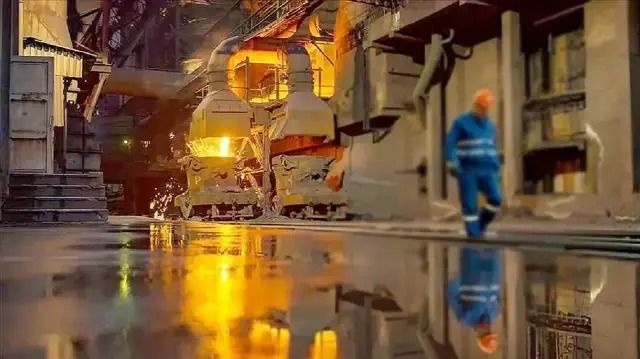Steel remains backbone of global industry amid shifting economic dynamics

Steel, the fundamental raw material for the construction, automotive, energy, and machinery industries, continues to stand as one of the indispensable pillars of the global economy.
Renowned for its durability, recyclability, and versatility, steel remains among the most critical building blocks of industrial production worldwide. Beyond being a symbol of industrialization, steel production serves as a strategic indicator of a nation’s economic strength. From renewable energy investments to large-scale infrastructure projects, steel plays a central role in sustainable growth and development.
According to data compiled from the World Steel Association, China produced 1 billion tons of crude steel in 2024 — more than the combined output of all other countries. Following China’s massive output, India ranked second with 149 million tons, while Japan took third place with 84 million tons. The United States followed with 79.5 million tons, Russia with 71 million tons, and South Korea with 63.6 million tons. Germany (37.2 million tons), Turkiye (36.9 million tons), Brazil (33.8 million tons), and Iran (31.4 million tons) completed the list of the world’s top ten steel producers.
Together, these ten countries account for approximately 85 percent of global steel production. However, China’s commanding 53 percent share makes global steel supply highly sensitive to fluctuations in its economy.
Responding to questions on the issue, Veysel Yayan, Secretary General of the Turkish Steel Producers Association (TÇÜD), noted that Türkiye exports steel to a vast geography stretching from Europe to the Americas, and from the Middle East to Africa.
Yayan emphasized that the Turkish steel industry, which exports to more than 180 countries, holds a unique position in the global supply chain.
“Türkiye ranked as the world’s eighth-largest steel producer in 2024, with 36.9 million tons,” Yayan said. “As of the first eight months of 2025, we have reclaimed our previous position as the world’s seventh-largest producer and the largest in Europe. Our industry’s flexibility, resilience, product quality, and commitment to timely delivery distinguish it positively from competitors. Moreover, even during periods of economic turbulence and global crises, our sector has maintained uninterrupted production.”
Recalling that many countries were forced to halt production temporarily during the COVID-19 pandemic, Yayan highlighted that Türkiye’s steel industry continued operations throughout that period.
Despite this resilience, Yayan warned that China’s dominance — accounting for more than half of global steel production — exposes not only Türkiye but all steel industries worldwide to global volatility.
“When internal consumption in China and other Far Eastern countries declines, their surplus production floods international markets,” he explained. “A mere 1 percent drop in Chinese steel consumption translates to roughly 10 million tons of exports — a volume that has caused significant disruption in global steel markets. New capacity additions in other Far Eastern countries may trigger similar imbalances between production and consumption.”
Yayan also pointed to protectionist trade measures as another major challenge undermining the competitiveness of the industry.
“Following the United States’ imposition of a 50 percent tariff, the European Commission’s move to reduce steel import quotas by 47 percent — along with Mexico and Canada preparing similar measures — shows that a large part of the global steel market is becoming closed to foreign suppliers,” he said. “This leaves major producers such as China, other Far Eastern countries, and Russia with no choice but to redirect their exports toward markets like Türkiye.”
Yayan warned that such developments threaten Türkiye’s steel exports to its largest market, the European Union, leading to potential losses in sales, reduced capacity utilization, and weakened profitability among producers.
“In the long term,” he added, “the continuation of such measures risks dampening investment appetite and delaying plans for capacity expansion. Nevertheless, Türkiye’s steel industry continues to pursue new strategies to protect its competitiveness. By diversifying markets, focusing on high value-added production, and investing in green transformation, our sector aims to strengthen its position in global trade.”
Yayan underscored that a strong steel industry not only supports economic growth but also safeguards national security, strategic independence, and sustainable development. Becoming dependent on foreign steel supplies, he warned, increases supply chain risks in critical sectors and makes national decision-making more vulnerable to external factors.
He went on to note that in recent years, the Turkish steel industry has made extensive, environmentally aligned investments to expand capacity — both to meet domestic demand and to boost export potential.
“The primary goal,” he said, “is to develop a high-quality, competitive, and sustainable production infrastructure. Capacity expansion projects focusing on high-value-added products are particularly noteworthy. Investments in the production of speciality steels used in the automotive, defense, energy, and shipbuilding industries are accelerating. These efforts not only increase Türkiye’s output but also enhance its product diversity and international competitiveness.”
Currently, Türkiye’s steel industry possesses enough capacity to meet domestic demand. However, capacity utilization stands at around 63 percent — a relatively low level. Imported inputs account for nearly 48 percent of total consumption, a figure that is about 2.5 times higher than the European Union’s 20 percent threshold, which has raised serious concerns in Brussels.
Yayan concluded by stressing that the share of imported inputs in domestic consumption should be reduced to more sustainable levels. To support capacity expansion, he called for stronger incentives for domestic production, balanced energy costs, and improved access to financing for environmental investments.
Here we are to serve you with news right now. It does not cost much, but worth your attention.
Choose to support open, independent, quality journalism and subscribe on a monthly basis.
By subscribing to our online newspaper, you can have full digital access to all news, analysis, and much more.
You can also follow AzerNEWS on Twitter @AzerNewsAz or Facebook @AzerNewsNewspaper
Thank you!
